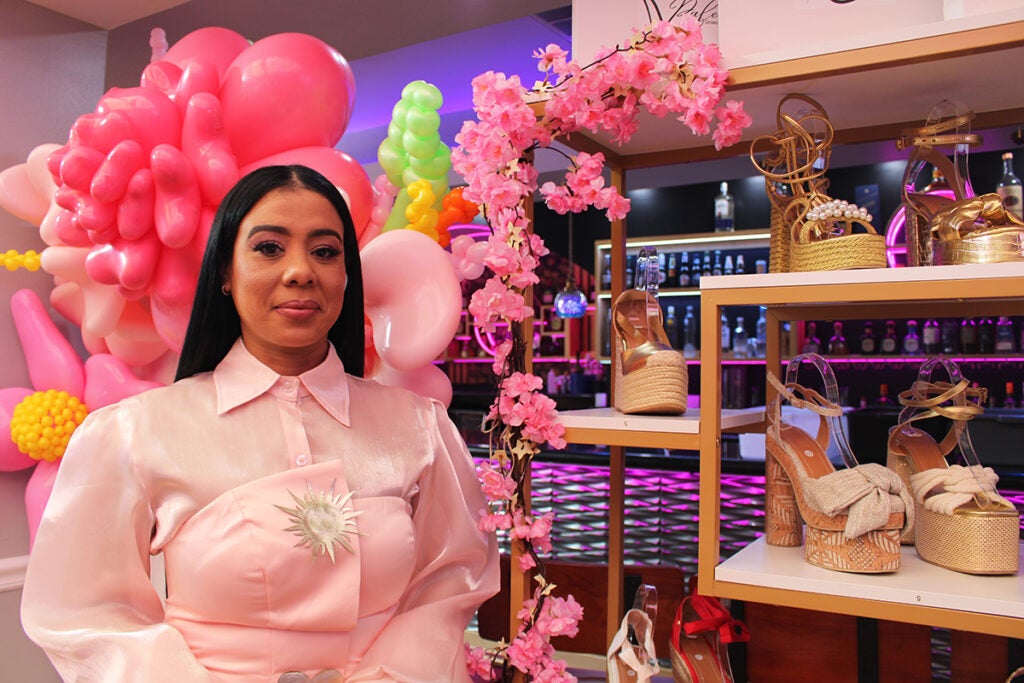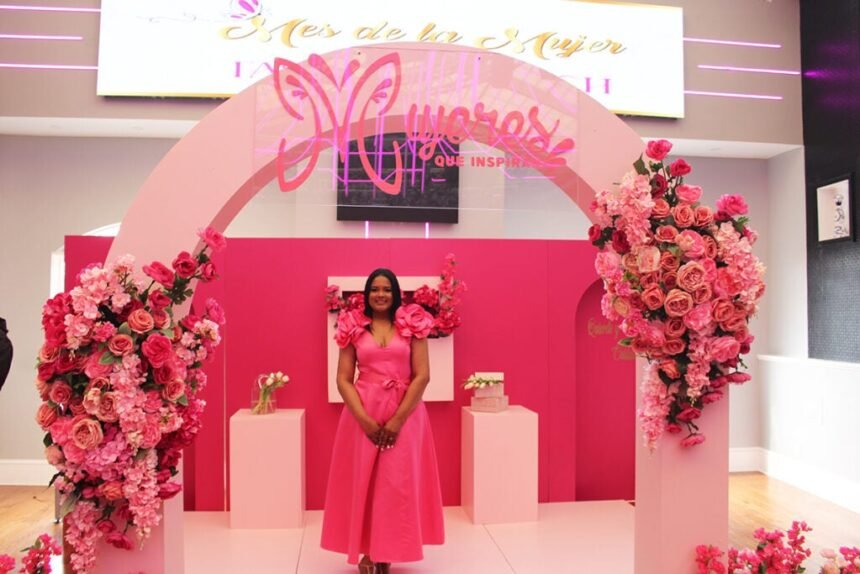From Philly and the Pa. suburbs to South Jersey and Delaware, what would you like WHYY News to cover? Let us know!
From doctors and stylists to lawyers and restaurant owners, an entrepreneur with a makeup line to the owner of a mechanic shop, the room at Tierra Colombiana in North Philly on Sunday was full of local Latina women who are succeeding in a number of industries.
More than 100 people attended the annual Women’s History Month event hosted by Mujeres Que Inspiran, an organization that works to support Latina business owners throughout the region.
Mayorie Paredes, president and founder of Mujeres Que Inspiran, said she decided to launch the nonprofit four years ago to provide events, conferences and workshops to motivate Latina women throughout the region to start their own businesses and/or take their brand or business to the next level.
“A veces se sienten que no pueden. Sienten … como que no voy a poder lograrlo”, dijo Paredes. “Y si uno la apoya, y la ayuda a creer en ella misma, puede llegar lejos”.
“Sometimes they feel that they can’t do it. They feel … like I’m not going to be able to achieve it,” Paredes said. “And if you support her, if you help her believe in herself, she can go far.”
Raysa Cancio, development director for Mujeres Que Inspiran, said the organization’s work is to help connect entrepreneurs with the tools they need to start and sustain successful businesses, whether that is navigating the process of registering your business or brand, or pursuing the right pathways for promoting your products.

“Sometimes you can feel so alone when you are an entrepreneur because you just know how to do your own work, but you don’t know the connections,” she said. “There’s a lot of resources that you by yourself, maybe do not have the access [to], but when you are part of Mujeres Que Inspiran, if we have the information, you are going to have it. If we can help you, we are going to find a way to help you.”
Foreign-born residents make up a third of all business owners in Philadelphia, according to a 2024 report from the Pew Charitable Trusts, which is double the percentage of immigrants in the city’s population. There are more than 20,000 Latino-owned businesses in the region, per the Greater Philadelphia Hispanic Chamber of Commerce. Statewide, 40% of small businesses are owned by women, according to the Pennsylvania Department of Community and Economic Development.
But immigrants face many challenges in starting new businesses and accessing professional development opportunities, Cancio said.
It’s a process the lawyer and founder of Latinos Solutions Center is all too familiar with. When Cancio first came to the United States from the Dominican Republic more than 10 years ago, at 22, she was already a lawyer. But she didn’t have access to a lot of information about how to get the accreditation she needed in the U.S. to transfer her skills and training to start practicing law.
“Poder ayudar a personas que se encuentran en la posición en la que yo estuve en algún momento, sin información, sin conexiones, a veces hasta sin esperanza, yo siento que estoy cuidando de la Raysa que llegó hace diez años a Filadelfia”, dijo ella.
“To be able to help people that find themselves in the same position that I was in at some point, without information, without connections, sometimes even without hope, I feel like I’m taking care of the Raysa that arrived in Philadelphia 10 years ago,” she said.

Sunday’s program focused on celebrating and honoring the Latina entrepreneurs who gathered for the event and providing some of those vital tools and resources.
Emma Villa-Gillam, a psychologist, offered advice to the women on how to take care of themselves and tend to their mental well-being while confronting the many challenges and barriers that exist for women and immigrant entrepreneurs.
“Veo que las mujeres progresan … y están creciendo, y esto está muy bien. Pero tenemos que tener un equilibrio. Hay muchas mujeres que dan demasiado, y no se cuidan la parte emocional que es tan importante”, dijo ella. “La parte emocional, especialmente las áreas, los traumas que hemos vivido, cuando llegamos a este país, o en cualquier lugar, si los traumas de nuestra infancia no son resueltos van a repercutir cuando somos adultas. Y eso muchas veces va a hacer que nosotras no podamos continuar”.
“I see these women making progress, and they’re growing, and that’s very good. But we have to have an equilibrium. There are a lot of women who give too much, and they’re not taking care of the emotional part which is so important,” she said. “The emotional part, especially the areas, the traumas that we’ve experienced, when we arrive in this country, or in any place, if the traumas of our childhood are not resolved, they’re going to reverberate when we’re adults. And that many times makes it so that we can’t continue.”











